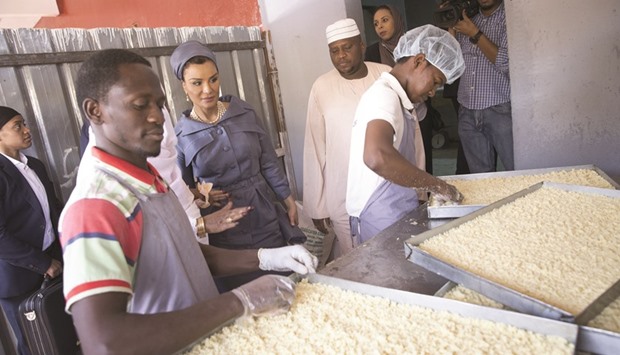HH Sheikha Moza bint Nasser, advocate for the UN Sustainable Development Goals, yesterday met with children, beneficiaries and staff at two of the projects her foundations are supporting to improve opportunities for young people in Sudan.
Sheikha Moza visited the Umm Badda Alternative Learning Programme (ALP) in Sudan’s capital, Khartoum.The programme is one of 3,900 in Sudan sponsored by Education Above All (EAA), a foundation set up by her in 2012.
Sheikha Moza engaged with children, attended a life-skills class, and met with school management, teachers and various community members.
EAA’s Educate A Child programme is supporting Unicef to educate 194 students at Umm Badda ALP, who were originally displaced from the regions of Abyei, Darfur and South Kordofan.
The ALP is designed for out-of-school children who have never attended school, have dropped out, or who cannot be mainstreamed into the formal education system due to gaps in their achievement. Linkages between formal and alternative programmes allow for the flexibility needed for these learners to later join the formal system at the appropriate level.
Educate A Child and Unicef support ALPs through the construction of new classrooms, textbooks and learning materials, training of facilitators, systems strengthening and partnership building.
Educate A Child and Unicef have provided more than 461,000 out-of-school children with access to quality primary education in Sudan. By the end of 2017, this partnership will provide direct support to 600,000 out-of-school children with an opportunity to access education.
Student Insaf Osman Mussa, who is enrolled at the Umm Badda ALP said, “Alternative learning centres have been a good alternative for me, as after I divorced, I kept insisting to get back to school to continue my education. I tried to enrol in a classic school, but found that I was weak in some courses, such as sciences.
“So people advised me to enrol in an Alternative Learning Programme centre, and benefit from upgrading my education before attempting to go back to a classic school.”
Sheikha Moza also witnessed the signing of several agreements between Silatech, the organisation she founded and chairs, and several Sudanese organisations. These new partnerships will lead to a series of initiatives aimed at creating one million new jobs for young Sudanese people by 2021
The signed agreements and memoranda of understanding include support for Sudan’s national food security strategy by creating a new generation of youth agribusiness entrepreneurs in collaboration with the Agricultural Bank of Sudan and working with the Qatar National Bank and Farmer’s Commercial Bank to provide financial support to young people in the agribusiness industry.
Silatech also signed a collaboration agreement with the National Commission for Refugees to support the economic empowerment of Syrian refugees in Sudan and a Memorandum of Understanding with the Supreme Council for Welfare & Intellectual Safeguard to prevent the radicalisation of young people. Finally, Silatech partnered with the Social Development Foundation to support the sustainable development of Khartoum.
Sheikha Moza then visited Niazy Mahsoub Wahbi, a young Sundanese man and a Silatech beneficiary who was able to expand his pastry business from a small workshop into a factory with two showrooms and a workshop of 12 through a micro-finance loan.

HH Sheikha Moza visits a Silatech beneficiary in Khartoum. PICTURES: AR Al-Baker / HHOPL
